Pharmacological properties
Pharmacodynamics
Nimesulide – the active pharmaceutical ingredient of the drug Nimesil – determines its belonging to the class of non-steroidal anti-inflammatory drugs. Nimesil has analgesic, anti-inflammatory and antipyretic activity, which is due to the suppression by nimesulide of the effects of COX, which is responsible for the biosynthesis of prostaglandins.
Pharmacokinetics
Good absorption is noted after per os administration. When administered orally to adult individuals at a dose of 100 mg of nimesulide, C max in blood plasma is 3-4 mg/l; t max – 2-3 h; AUC – 20-35 mg ∙ h / l.
A high degree of binding to blood plasma proteins (95%), good penetration into the tissues of the female reproductive system (≈40% of the content in blood plasma after a single dose), foci of inflammation (40%) and synovial fluid (43%) has been described. It overcomes the blood-brain barrier well.
It is actively metabolized in the liver with the participation of cytochrome P450 2C9 (thus interaction with other drugs – substrates of this enzyme is likely). The main active metabolite is 4-hydroxynimesulide. T ½ of nimesulide is 3.2-6 hours.
Nimesulide is excreted through the kidneys (≈50% of the administered dose) and with feces (≈29%), in unchanged form – approximately 1-3%.
Indication
Dorsalgia (lumbalgia); dental pain; pathology of the musculoskeletal system – traumatic injury, joint dislocation, distortion, tendonitis, bursitis (treatment of pain syndrome); osteoarthritis (treatment of pain syndrome); algodysmenorrhea.
Application
Orally, after meals.
The contents of the sachet are dissolved in a glass of water and drunk.
Adults – 100 mg of nimesulide (1 sachet) twice a day.
Duration of treatment – ≤15 days.
There is no need for dose adjustment in elderly patients.
Contraindication
Hypersensitivity, BA, polyposis of the nasal cavity (recurrent) and / or paranasal sinuses, idiosyncrasy to ASK, as well as other non-steroidal anti-inflammatory drugs; heart failure (decompensation stage); lesions of the upper gastrointestinal tract of an erosive-ulcerative nature; hemorrhage in the gastrointestinal tract (active phase); cerebrovascular or any other hemorrhages; hemophilia and / or other pathology of the vascular-platelet and coagulation hemostasis system; alcohol / drug addiction; history of hepatotoxic reactions (when using nimesulide); severe degree of impairment of homeostatic renal function (CC 30 ml / min); renal pathology (progressive course); impaired liver function; Crohn’s disease, ulcerative colitis (exacerbation phase); hyperkalemia (diagnosed laboratory and clinically); Coronary artery bypass grafting (postoperative period); combined use with other hepatotoxic agents; pregnancy and/or breastfeeding; children’s age (12 years).
Side effects
Thrombocytopenia, eosinophilia, anemia, pathological decrease in the content of all formed elements of the blood, hypersensitivity (including anaphylactic reactions, angioedema), hyperkalemia, nervousness, dyssomnia, vertigo, cephalalgia, encephalopathy, hypersomnia, decreased visual acuity, etc., tachycardia, ag, hemorrhage, fluctuations in blood pressure, flushing, shortness of breath, ba / spasm of smooth muscles of the bronchial wall, diarrhea, nausea / vomiting, constipation, intestinal gases, gastritis, bleeding in the gastrointestinal tract, gastrointestinal ulcer, perforation of ulcers of the upper gastrointestinal tract, abdominal pain, dyspeptic phenomena, stomatitis, melena, fulminant hepatitis, jaundice, cholestasis, increased activity of liver enzymes, dermatitis, itching, skin rashes, urticaria, increased sweating, facial edema, erythema multiforme, Stevens-Johnson syndrome, Lyell’s syndrome, urination disorders, oliguria, ischuria, hematuria, impaired homeostatic function of the kidneys, interstitial nephritis, edema, asthenia, hypothermia.
Special instructions
If there is no effect from the treatment with the drug, its use must be discontinued.
During therapy with the drug, it is necessary to refrain from drinking alcoholic beverages and the combined use of drugs with proven hepatotoxicity.
If severe liver reactions develop, the use of the drug must be discontinued immediately.
It is necessary to take into account the increased frequency of adverse reactions when using NSAIDs in elderly patients.
Nimesulide treatment should be started with the lowest effective dose in patients with a history of gastrointestinal ulcer complicated by bleeding/perforation (due to the increased risk of ulcerogenesis in the gastrointestinal tract, especially with increasing NSAID doses).
NSAIDs should be prescribed with extreme caution to patients with a history of Crohn’s disease or ulcerative colitis.
Patients with acute heart failure, uncontrolled arterial hypertension, diagnosed coronary artery disease, pathology of peripheral arteries and/or cerebral vessels are prescribed nimesulide after a thorough assessment of the body’s condition.
The drug should be administered with caution to patients with kidney disease or heart failure due to the likelihood of decreased renal function.
The drug is not recommended for patients planning pregnancy, due to the possible impairment of fertility in women when using nimesulide.
Inhibition of COX activity and, accordingly, prostaglandin biosynthesis has a negative effect on the course of pregnancy and/or fetal development.
Interactions
Concomitant use with corticosteroids increases the likelihood of gastrointestinal ulceration or bleeding.
The likelihood of gastrointestinal bleeding increases when used together with antiplatelet agents and SSRIs.
Concomitant use with anticoagulants (e.g. warfarin) enhances the effect of the latter.
When used simultaneously with diuretics, a decrease in their effect is noted.
There is a weakening of the hypotensive effect when used simultaneously with angiotensin II receptor antagonists and ACE inhibitors.
Simultaneous use with lithium preparations leads to a decrease in its clearance and, accordingly, an increase in its content in the blood and an increase in its toxic effect.
As a result of the suppression of the activity of the cytochrome P450 2C9 enzyme by nimesulide, the content of drugs metabolized by this enzyme in the blood may increase.
Simultaneous use with fungicidal, antituberculosis drugs, anticonvulsants, as well as methyldopa, amoxicillin / clavulanic acid, methotrexate and amiodarone can cause a hepatotoxic effect.
Due to the increased toxicity, extreme caution is required when taking nimesulide within 24 hours before or after the use of methotrexate.
Overdose
It is manifested by lethargy, hypersomnia, nausea, vomiting, epigastric pain. With adequate supportive treatment, the symptoms are reversible. In rare cases, gastrointestinal bleeding, acute respiratory distress syndrome, respiratory failure, coma may develop. Treatment is supportive and symptomatic. There is no specific antidote.
Storage conditions
No special storage conditions are required.

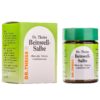
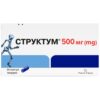

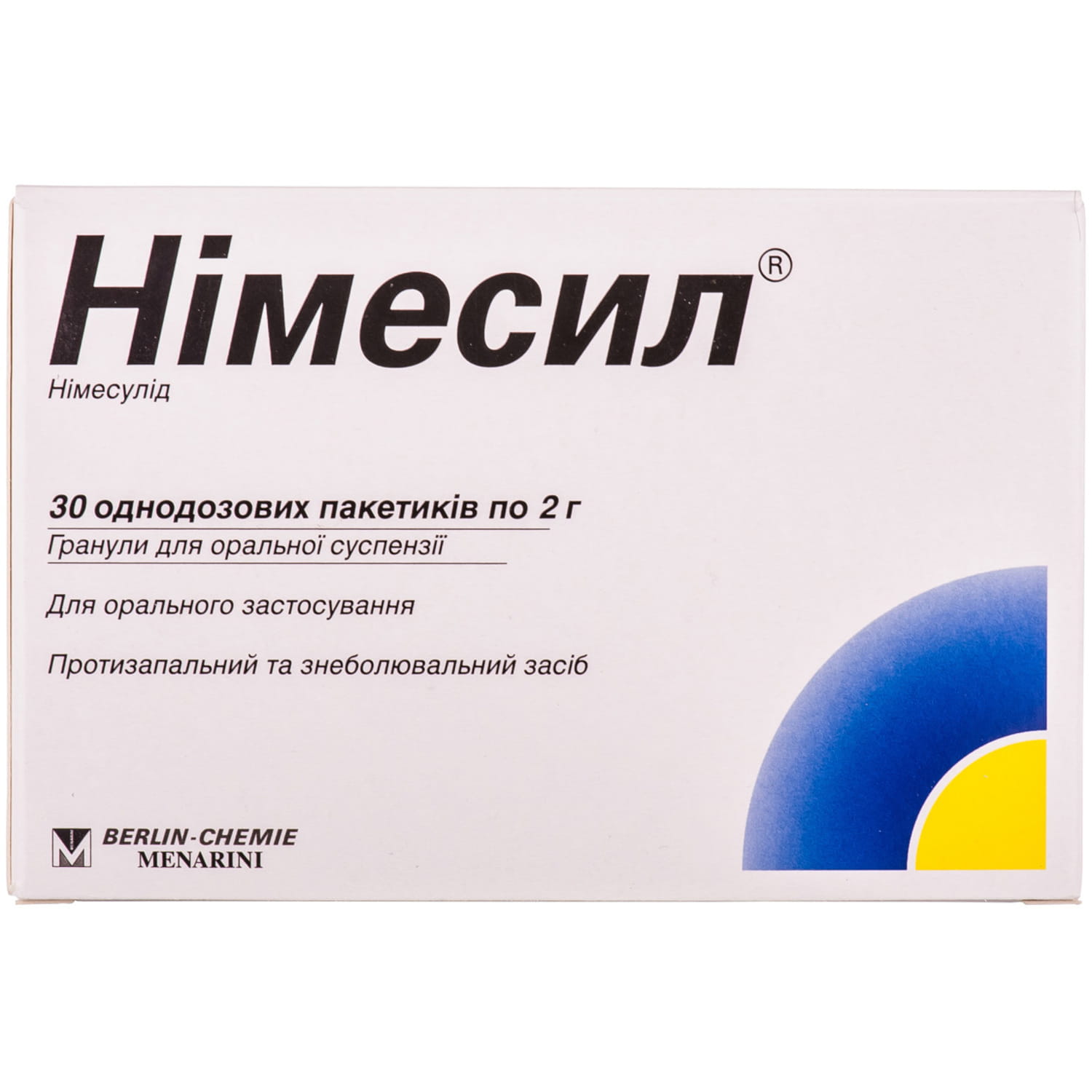
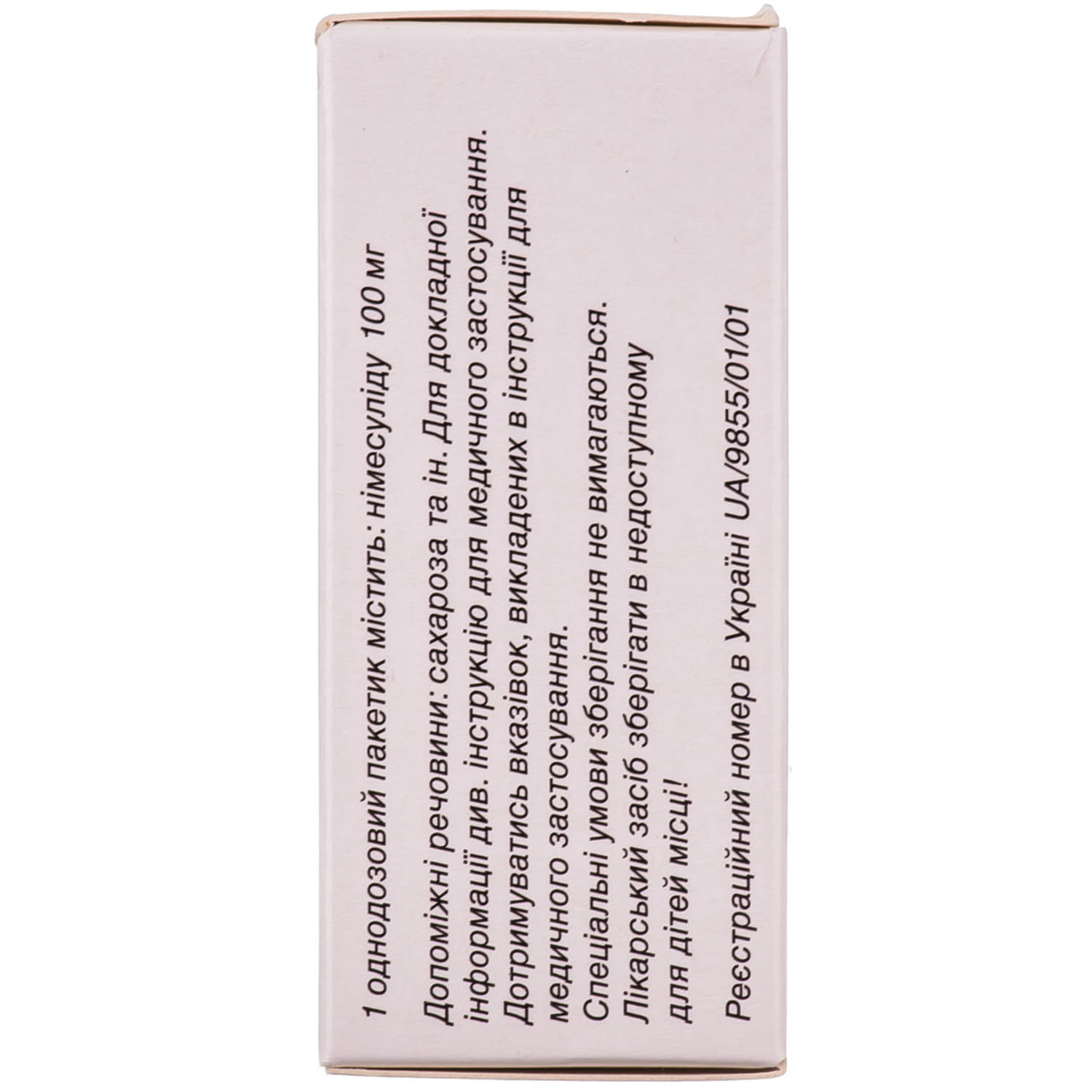

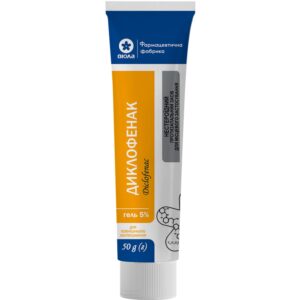
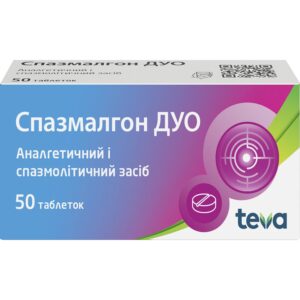
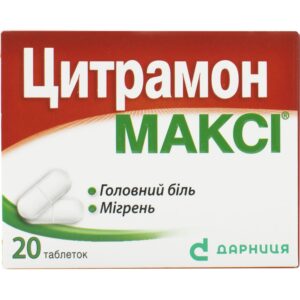

Victor –
Great for reducing fever. I took it when I had covid.